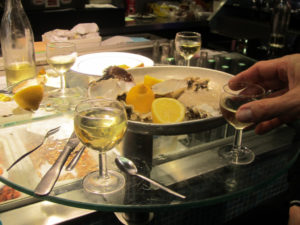
At the University of Stellenbosch in South Africa, Marianne McKay chooses a corner of the outdoor café patio in the botanical garden to meet. The weather is warm enough to wear short sleeves. Trees grow thick behind us. Marianne has reddish hair and a purple shirt. She wears a necklace of varied blue stones on a black strand, a gold ring, and a silver bracelet.

Marianne talks about her recent work trying to determine the cause of a supposed odd taste in various South African wines. After a wine writer for The Times of London denigrated many South African red wines as having what she called “…a peculiar, savage, burnt rubber and dirt odour,” the wine industry of South Africa got a bit riled up and decided to seek objective information. They contacted the university to investigate.
“They’re few and far between, real burnt rubber stinkers,” said Marianne. “They’re not that easy to find and I know because I’ve tested a lot of wine. It’s very obvious. Once you’ve tasted it you never forget it easily. The journalist who started the whole thing, she’s British.
“A couple of cellars are aware that they have a problem. There are other cellars that don’t have a clue. One of the wines we picked out last week or the week before – we tested it. It’s definitely got some problem, and just now won some huge competition in the UK as being this fantastic wine. We tasted it and we said it was just reeking of burnt rubber. So there you go. Some people love it. Some people think it’s great. It’s a completely personal taste. I know a couple of people who dislike it intensely. We’re trying to do something about it.
“There are a number of different things it could be. A lot more wines are going under screw cap. If you have sulfur compounds produced by yeast during fermentation because they’re under stress – temperatures too low or too high or they haven’t got the right nutrition or whatever the case may be – those sulfur compounds may not be at detectable levels when they go into the bottle, but once they’ve been in the bottle for awhile, they change. Or other things like dimethyl sulfide which at low levels can be very pleasant and enhance fruitiness in wine but if you get it at higher levels, it becomes stinky and can smell sulfurous. All sorts of factors come in.

“Because people don’t realize that you have to make wine differently if you’re putting it under screwcap. You have to give it more oxygen throughout the entire process and tailor your wine for the fact that it’s not going under cork. If you make wine under cork you can make it more reductively, because it’s going to be probably exposed to a little more oxygen than it would be under screwcap.

“I was the first woman in South Africa to get an MSc in agriculture. The whole wine industry was dominated by old Afrikaans white men. And I came from the University of Cape Town, which was this hotbed of political activism and communism and helicopters flying over and tear gas.
“I was born in England. Bradford-on-Avon. Tiny. Near Trowbridge, which is near Bristol. But I grew up here. My parents came over when I was five. I never felt that I belonged in England. Always wanted to come back to Africa.
“I love teaching. Yes, that’s the reward. [This woman named] Linda came into the course…and she was forty, a single mum. She just wanted to do wine. She’d been an exotic dancer and a trapeze artist. Very pretty and personable. Absolutely no scientific background whatsoever. And she came in and suddenly realized she just bloody loved science. You watch these people who are so lacking in self-confidence and so wanting to learn but so scared to ask questions. And you watch them turn into confident people who can evaluate and critically analyze and think. That’s what makes me happy. That’s why I do what I do.
“And this ridiculous move to drink less wine because it’s unhealthy? Just terrible. People should drink more wine. Red wine’s a marvelous thing.”





jlcollinsnh
15 Mar 2012We’re doing our part; drinking more red wine that is.
I don’t much care for South African wines and never thought much about why. I don’t recall this burnt rubber taste, but the next time one comes my way I’ll be looking for it.
Interesting to see screw caps being more widely used on bottles of good wine. I used to work with a guy who would never order these bottles for our business entertaining. There were some very fine wines we missed this way, but he was concerned our clients would note the cap and assume he’d cheaped out. too bad, but this too shall pass.
vinoexpressions
15 Mar 2012I talked with a cork maker in Portugal who said the screwcap industry had organized a PR campaign to rip into the fact that some wines are ‘corked’ and taste awful. But the result of this onslaught was that cork manufacturers banded together and seriously improved their quality. The factory floor of this cork producing factory looked like as clean as a Swiss living room. Screwcaps are easier to open, but I love the process of taking a cork from a bottle. It’s a little ritual that marks the beginning of cocktail hour. Glad you’re doing your part to keep the red wine industry healthy.
Lisa Hazard
16 Mar 2012I’ve never tasted South African wine. Have to give it a try!